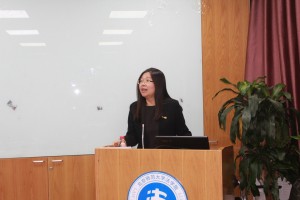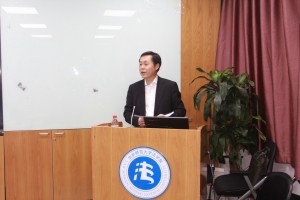![IMG_1810[1]](http://wiki.iipl.org.cn/wp-content/uploads/2019/11/IMG_18101-e1575014845534-300x225.jpg) The possibility of a new Renaissance made possible by Artificial Intelligence – which in the national strategy proposal drawn up by a group of experts appointed by the Government, is defined as RenAIssance – represents an exciting challenge to deal with: future of work, interpersonal relationships as well as social and environmental protection, will inevitably be affected by the impact that Artificial Intelligence systems will increasingly have in everyday life. Then, it is important to face, both from the legal and ethical-anthropological point of view, the relationship between man and intelligent machines, in order to preserve the human being in his cultural and material wealth. In this context, the European University of Rome, with the Innovation Law Laboratory (InnoLawLab) has enriched its educational offer with the post-graduate Master’s Degree on “Artificial Intelligence: Law and ethics of emerging technologies”, aimed at providing students with the necessary knowledge to understand the impact and the legal functions of Artificial Intelligence and other emerging technologies (Blockchain, IOT, 5G), in order to address the issues underlying its development and the spread of AI systems.
The possibility of a new Renaissance made possible by Artificial Intelligence – which in the national strategy proposal drawn up by a group of experts appointed by the Government, is defined as RenAIssance – represents an exciting challenge to deal with: future of work, interpersonal relationships as well as social and environmental protection, will inevitably be affected by the impact that Artificial Intelligence systems will increasingly have in everyday life. Then, it is important to face, both from the legal and ethical-anthropological point of view, the relationship between man and intelligent machines, in order to preserve the human being in his cultural and material wealth. In this context, the European University of Rome, with the Innovation Law Laboratory (InnoLawLab) has enriched its educational offer with the post-graduate Master’s Degree on “Artificial Intelligence: Law and ethics of emerging technologies”, aimed at providing students with the necessary knowledge to understand the impact and the legal functions of Artificial Intelligence and other emerging technologies (Blockchain, IOT, 5G), in order to address the issues underlying its development and the spread of AI systems.
Prof. Xue was invited by the Director of InnoLawLab of European University of Rome, Prof. Stazi, to give a keynote speech at the Seminar ” RenAIssance: Artificial Intelligence for a new Renaissance between development opportunities and need for protection” on 14 October, 2019, 12.30 pm at Fondazione Alcide De Gasperi Rome, Via del Governo Vecchio 3. Prof. Xue talked about the various legal impacts of deployment of AI in international trade. She examined a variety of legal areas that may be affected including the contract law (automated and intelligent contracting agent), data protection law (GDRP’s ban on automated data process) and international trade law (3D and other tech to circumvent the trade barriers). She also answered many questions from both the faculties and students. Her presentation was warmly hailed by all the audience.
Program
Introduction
Pedro Barrajón LC
Rector of the European University of Rome
Keynote Speeches
Giorgia Abeltino
Director Government Affairs & Public Policy South Europe, Google
Economy of Intelligence and Smart Regulation
Hong Xue
Beijing Normal University Law Professor, Director of Institute for Internet Policy & Law (IIPL) and Co-Director of UNCITRAL-BNU Joint Certificate Program on International E-Commerce
AI in International Trade Law
Presentation of the Master’s Degree on “Artificial Intelligence: law and ethics of emerging technologies”
Emanuele Bilotti
Full Professor of Private Law – Coordinator of the Master’s degree in Law – European University of Rome
Round Table
Artificial Intelligence, Blockchain and Internet of Things: Emerging technologies and challenges for law, ethics, economy and job
Discuss:
Laura Di Raimondo, General Director Asstel
Paolo Cherubini, Foundation Terzo Pilastro Internazionale
Emanuela Girardi, Associazione Pop AI – MISE expert group
P. Alberto Carrara, Università Europea di Roma
Marco Scialdone, InnoLawLab – Università Europea di Roma
Moderates: Raffaele Barberio, Key4Biz
Conclusion
Artificial Intelligence: Which policies for innovation, research and development
Luca Carabetta, Vice-President of the Productive Activities Commission Chamber of Deputies – Artificial Intelligence Parliamentary Intergroup
Anna Ascani*, Undersecretary of the Ministry of Education, University and Research

![IMG_1854[1]](http://wiki.iipl.org.cn/wp-content/uploads/2019/12/IMG_18541-e1575254353179-187x250.jpg)


![IMG_1810[1]](http://wiki.iipl.org.cn/wp-content/uploads/2019/11/IMG_18101-e1575014845534-300x225.jpg)
![IMG_1775[1]](http://wiki.iipl.org.cn/wp-content/uploads/2019/11/IMG_17751-e1572602124325-300x225.jpg)